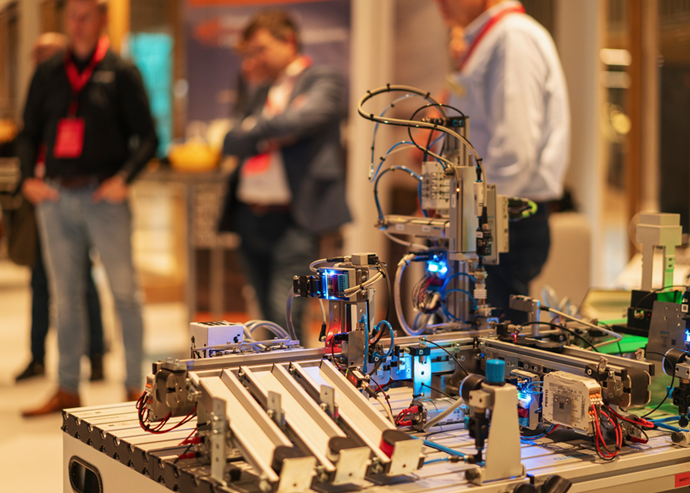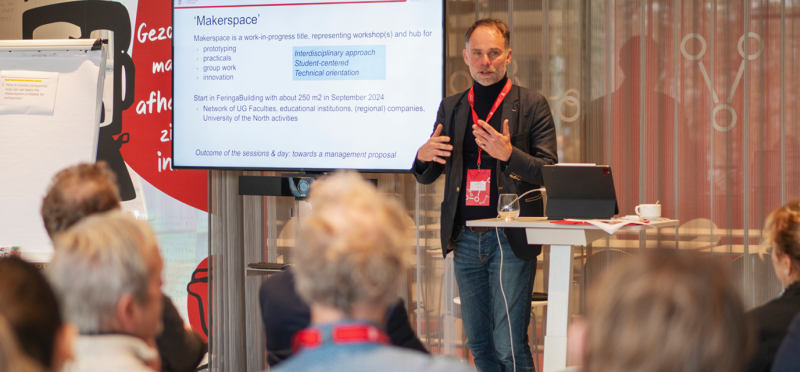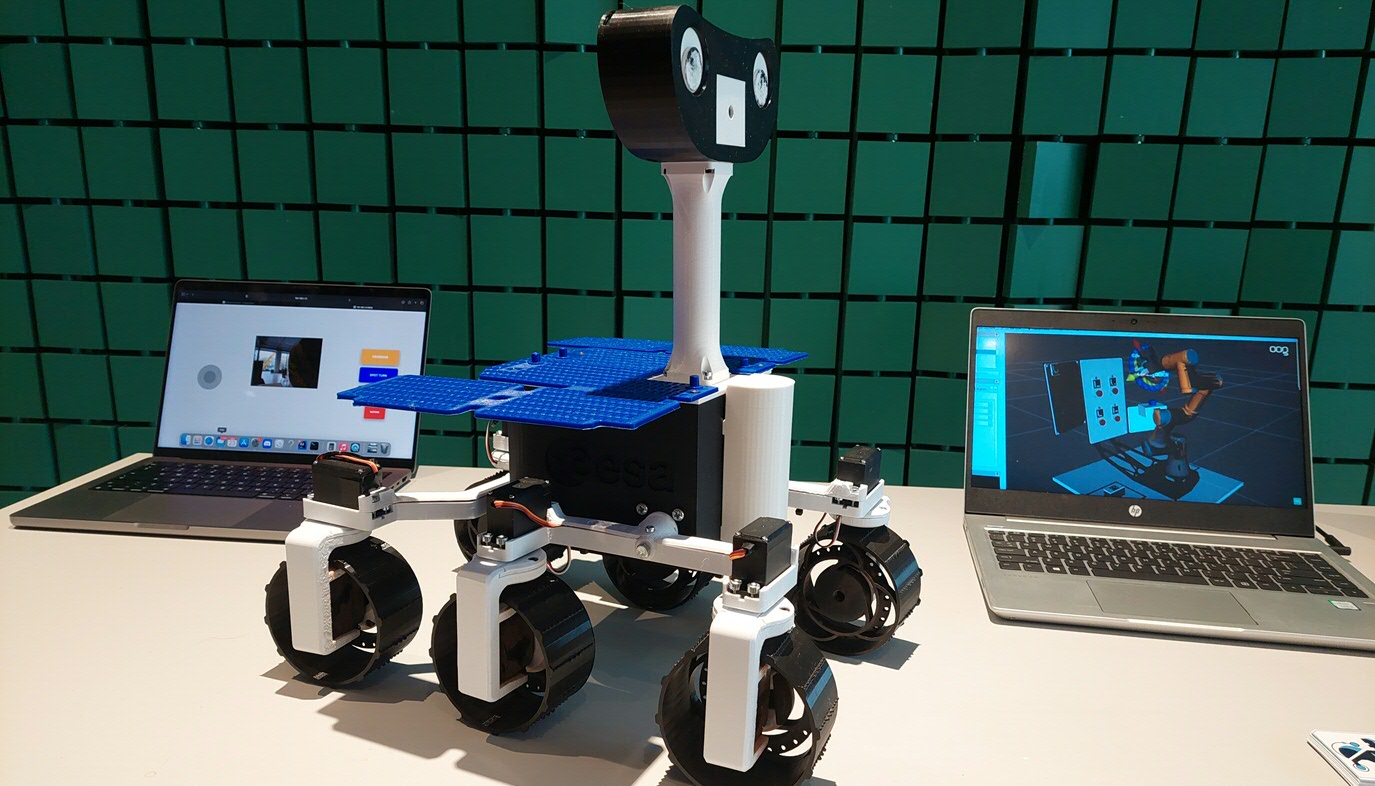'A makerspace at the UG would help enormously'

How do you create a place at the university where students can create, innovate and collaborate across disciplines? That question was the focus of the 'Makerspace' event at House of Connections on 23 November, organised by the Jantina Tammes School. You can read a report on the event here.
Robotic arms, 3D printers and a Mars rover: there is plenty to see on the first floor of the House of Connections. Even before the event officially begins, several visitors feast their eyes at the various stands at the event 'Makerspace; How to Empower Creativity, Collaboration and Innovation?' The day serves as inspiration for a new 'makerspace' to be established at the University of Groningen, a space where students come together to create, learn, innovate and discover.
Demographic challenges
The meeting kicks off with a lecture by Wilbert van den Eijnde, lecturer in Smart Sustainable Manufacturing at NHL Stenden. In his talk, he discusses major demographic challenges facing the northern Netherlands. The new influx of (technical) talent is declining rapidly, while the population is ageing. Who will soon build, maintain and operate the machines in factories? The only option is to increase productivity, Van den Eijnde argues.
To achieve this goal, a self-sufficient, high-tech ecosystem is needed, the lecturer continues. The fourteen 'technology centres' in the northern Netherlands play a crucial role in this. These are places where business, knowledge institutions and other stakeholders work together on the latest technical innovations. The concept is not quite the same as a makerspace, where the emphasis is on education, but ultimately both contribute to retaining (technical) talent and developing technology in the North.
Plans
Lecturer and researcher Gerald Jonker is one of the initiators for a makerspace at the University of Groningen. Partly due to the growth in engineering students at the Faculty of Science and Engineering (FSE), there is a need for such a space, he says. With his colleagues, Jonker mapped out the possibilities for a makerspace. The first ideas and proposals were received positively by the board. 'Exactly at that point we are today,' Jonker says. 'The question now is how are we going to do it? What exactly will be its function and what do we want to achieve with it? That is what we are going to work on.'
The 'makers market', hosted at the House of Connections, already serves as inspiration. The market features companies and educational institutions, such as Hanze and Noorderpoort, as well as UG students and staff. Taraneh Mokabber is one of them. She is Research & Education Officer at the UG research group Discrete Technology & Production Automation (DTPA) and is demonstrating three robotic arms at her stall. The robots are used for hands-on practice, she explains. 'With these, our students learn programming as well as how to build and optimise a robotic arm.'

Digitisation
A bit further on stands Lars de Groot, managing director at Demcon Industrial Systems. He tells about a cooperation of 25 parties from the northern Netherlands in the field of 'smart industry', as part of the National Growth Fund programme NXTGEN Hightech. 'To operate machines, you need skilled workers with a lot of experience. But nowadays, workers don't stay in the same place for 30 years. Moreover, there are too few people,' De Groot knows.
According to De Groot, innovation is therefore indispensable. It's all about digitisation, he says. 'Think of reducing all the sensors in a factory to one screen.' At the maker market, De Groot shows a beer line, allowing students to practice. ‘This is something we have just started. At this line, everything is still analogue. In the future, we want to digitise the process. With this beer line, students can gain experience with the process.'
How does De Groot view the future makerspace at the RUG? 'It's a great opportunity to work together. First and foremost, I would also look at what is already there, at mbo and hbo. We shouldn't start doing the same thing at different levels.'
Interdisciplinary
One of the educational institutions with experience is the Hanze University of Applied Sciences. Several creations from the Hanze Makerspace are displayed at their stall. From a 3D-printed Martinitoren to a fully equipped robot. 'It's a place for and by students,' says one of them. 'As long as you follow the guidelines, the sky is the limit: you can create whatever you want here. We also have a very diverse group of students, from Psychology to Mechanical Engineering. Our Makerspace is not limited to STEM students.'
The interdisciplinary aspect should also be reflected in the UG's makerspace, says initiator Jonker. 'We want to work across disciplines. It's not about submitting an equipment list, which is only the end of the process.' Jonker is enthusiastic about today's interest, he concludes after the afternoon's 'break-out' sessions. 'You can see there is a real need.'
Helpful
That is something the team members of CybaNorth agree on. Next year, the Groningen students will compete in the Cybathlon in Zurich. The event is similar to the Olympics, except that it involves wearable technology. The students are competing in the arm prosthesis race. 'A makerspace would help us a lot. It would allow us to communicate with each other much more easily, which would greatly simplify and speed up development,' one of the team members concludes.

The event 'Makerspace; How to Empower Creativity, Collaboration and Innovation?' took place on 23 November at the House of Connections. It was organised by the Jantina Tammes School of Digital Society, Technology and AI. With contributions from: Festo Didactic, Hanze Hogeschool, Noorderpoort, NHL Stenden, Demcon, FSE Faculty (UG), AiHub Noord, Noorden Digitaal, FEB faculty (UG), CybaNorth and Makercie (Mars Rover).
More news
-
15 September 2025
Successful visit to the UG by Rector of Institut Teknologi Bandung

